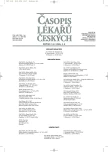-
Medical journals
- Career
Role of Intestine in Immunity Mechanisms
Authors: T. Fučíková
Authors‘ workplace: Ústav imunologie a mikrobiologie 1 . LF UK a VFN, Praha
Published in: Čas. Lék. čes. 2005; 144: 614-616
Category: Review Article
Overview
The intestinal mucosa represents important primary interface with the external environment. The mucosal immunity posses the ability to differentiate between non-pathogenic microbial agents (non-inflammatory immune reaction) and pathogens (inflammatory immune response). The defence mechanisms of intestinal mucosa due to extensive nonadaptive and adaptive immune reactions facilitate both inductive and effector side of immune response. The oral tolerance is dependent on the mucous intestinal immunity and modulates the systemic immune reactivity.
Key words:
enterocytes, Paneth cells, mucous immunity, defensins, M cells.
Labels
Addictology Allergology and clinical immunology Angiology Audiology Clinical biochemistry Dermatology & STDs Paediatric gastroenterology Paediatric surgery Paediatric cardiology Paediatric neurology Paediatric ENT Paediatric psychiatry Paediatric rheumatology Diabetology Pharmacy Vascular surgery Pain management Dental Hygienist
Article was published inJournal of Czech Physicians

-
All articles in this issue
- Tuberculosis in the Czech Republic in the Year 2004
- Shared Pathogenesis of Infectious and Cardiovascular Diseases – Year 2005´s View
- The Risk of Malignancy After Organ Transplantation
- Treatment of the Unresectable Non Small Cell Lung Carcinoma
- Role of Intestine in Immunity Mechanisms
- Intestinal Ischemia Represents Serious Surgical Problem
- Percutaneous Vertebroplasty
- Neuronal Network
- Differential Diagnosis of Peripheral Neuropathy
- Bortezomib (Velcade) in Relapsed/Refractory Multiple Myeloma The First Experience in the Czech Republic
- Latex Allergy – Report on Two Cases
- Czech Medical Doctors and World No Tobacco Day on May 31, 2005
- From the History of Endocrinology: Reminiscence of the Discovery of Adrenocortical Hormones
- Journal of Czech Physicians
- Journal archive
- Current issue
- Online only
- About the journal
Most read in this issue- Latex Allergy – Report on Two Cases
- Differential Diagnosis of Peripheral Neuropathy
- From the History of Endocrinology: Reminiscence of the Discovery of Adrenocortical Hormones
- Intestinal Ischemia Represents Serious Surgical Problem
Login#ADS_BOTTOM_SCRIPTS#Forgotten passwordEnter the email address that you registered with. We will send you instructions on how to set a new password.
- Career

